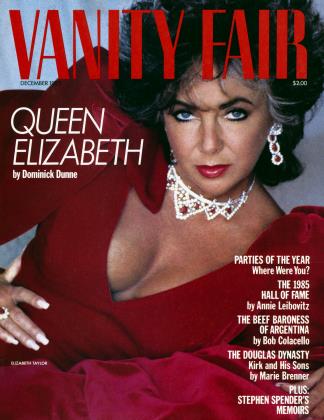Sign In to Your Account
Subscribers have complete access to the archive.
Sign In Not a Subscriber?Join NowMOVIES
The Gloss of Innocence
Stephen Schiff
Was it only seven or eight years ago that moviegoers were lamenting the paucity of meaty women's roles? Now every autumn brings Sissy Spacek saving the South, Jessica Lange steamrolling over unworthy lovers, Sally Field hitching up her pout and plowing toward glory. It's men who don't have choices in the movies anymore. If they're not action heroes, they're wan geisha boys ministering to proud mistresses—like Kurt Russell in Silkwood, Beau Bridges in Norma Rae, Ed Harris in Sweet Dreams, Edward Herrmann in Compromising Positions, Mandy Patinkin in Maxie, Charles Dance in Plenty. There are no fun couples in today's movies, no Tracy and Hepburns, no Nick and Nora Charleses. When the hero is a woman, the bimbo is a man.
Watching Sissy Spacek defend truth, justice, and the American way in Marie, I kept imagining how different the movie would have been with a male protagonist. Marie is the factual story of a lone crusader fighting the fleshiest fat cats in Tennessee: when they fire her and kill two witnesses, she sues to prove her rectitude.. Would Hollywood let a man entrust his fate to a smooth lawyer and a righteous jury? Not likely. Audiences wouldn't stand for it—they'd keep wondering when the idiot would wake up and buy a gun. Male heroism in the movies (and on television) has become grimly simple: somebody shoots at you; you shoot back. When men aren't pouring the Formosa oolong for their embattled mates, they are cops, soldiers, spies, or cartoony avengers; if they're none of the above, you're watching either a comedy or the year's ninety-eighth film about bicycle racing.
Is this state of affairs good for women? Certainly the eighties have produced a crop of fortyish actresses as dazzling as the covey of elegantly aging glamour boys—from Redford to Eastwood—who dominated Hollywood in the seventies. And the heroine genre is maturing. In the old days of Julia and Norma Rae, women could hardly hiccup without male counseling; now we have Sweet Dreams, the Patsy Cline biography, in which Jessica Lange, all crooked sneers and juggernaut hips, fires off fusillades of chaffing wit while hubby Ed Harris stares into the far end of a beer mug, mooing wistfully. Still, Sweet Dreams isn't about anything: she sings, she scraps, she dies. The movies haven't figured out what to do with a woman who knows who she is and what she wants. Most of the heroine pictures are still about women slowly wising up, and they depend on an assumption that refuses to die: that women are pitiable know-nothings whom circumstances prod toward greatness.
Once upon a time, there was a place in movies for male innocence, too. When the revelations of Watergate made us all feel we'd been too easily bamboozled, Hollywood coughed up a stream of paranoid-conspiracy movies like Three Days of the Condor, The Parallax View, and The Conversation, in which such he-men as Redford and Beatty and Hackman confronted evils they had never dared contemplate. Now, in Reaganaut America, we feel macho and puissant, impatient with our former wimpiness; in movies, the passage from innocence to experience is reserved for high-school wonks—and for women. In Eleni, Kate Nelligan is trusting as only a mama can be—and, sure enough, the rotten Commie she shelters eventually betrays her. Events destroy her innocence and cultivate her cunning, but the movie doesn't applaud her awesome courage, her awesome derring-do, or her awesome ability to keep her eyes wet and shiny. It imputes all her strength to a mother's native purity: she dies crying "My children!''
Eleni is a dreadful movie, but at least its protagonist is a grown-up. Most heroine pictures rely on our hidden conviction that women are really overripe children—which may be why those perfect child-women Sally Field and Sissy Spacek keep starring in them. When goons threaten Clint Eastwood, the audience wants to yell "Kill 'em, Clint.'' But when they're after one of these child-women, we want to yell "Leave little Sissy alone, ya big ape.'' That's how heroine movies create suspense.
And that, in the end, is what ruins them. I've been wondering why I feel so utterly unstirred by Spacek's plight in Marie, or by a dozen other heroines' woes in a dozen other movies. These films remind me of those horror pictures in which something unspeakable lurks in the basement and the heroine—clearly no rocket scientist—decides she'll creep down the dark stairs for a looksee. In Marie, Spacek is a chirpy little thing whose dashing acquaintance Jeff Daniels gets her a job working for the governor. Two minutes after we meet Daniels, he's talking about loyalty to the governor, about paroling a thug whose dad was a big campaign contributor—the movie is fairly screaming, "Something awful is in the basement,'' and yet Spacek is still dimpling and tossing her curls, still tripping blithely downstairs. One is concerned for her, of course, as one is concerned for a toddler who has fallen on the sidewalk, but when she finally triumphs—well, how heartily can we applaud a little freckleface who skinned her knee and didn't cry? Reducing men to gunslingers and women to symbols of mindless virtue, Hollywood is making it harder than ever to take serious movies seriously.
 View Full Issue
View Full Issue


















Subscribers have complete access to the archive.
Sign In Not a Subscriber?Join Now